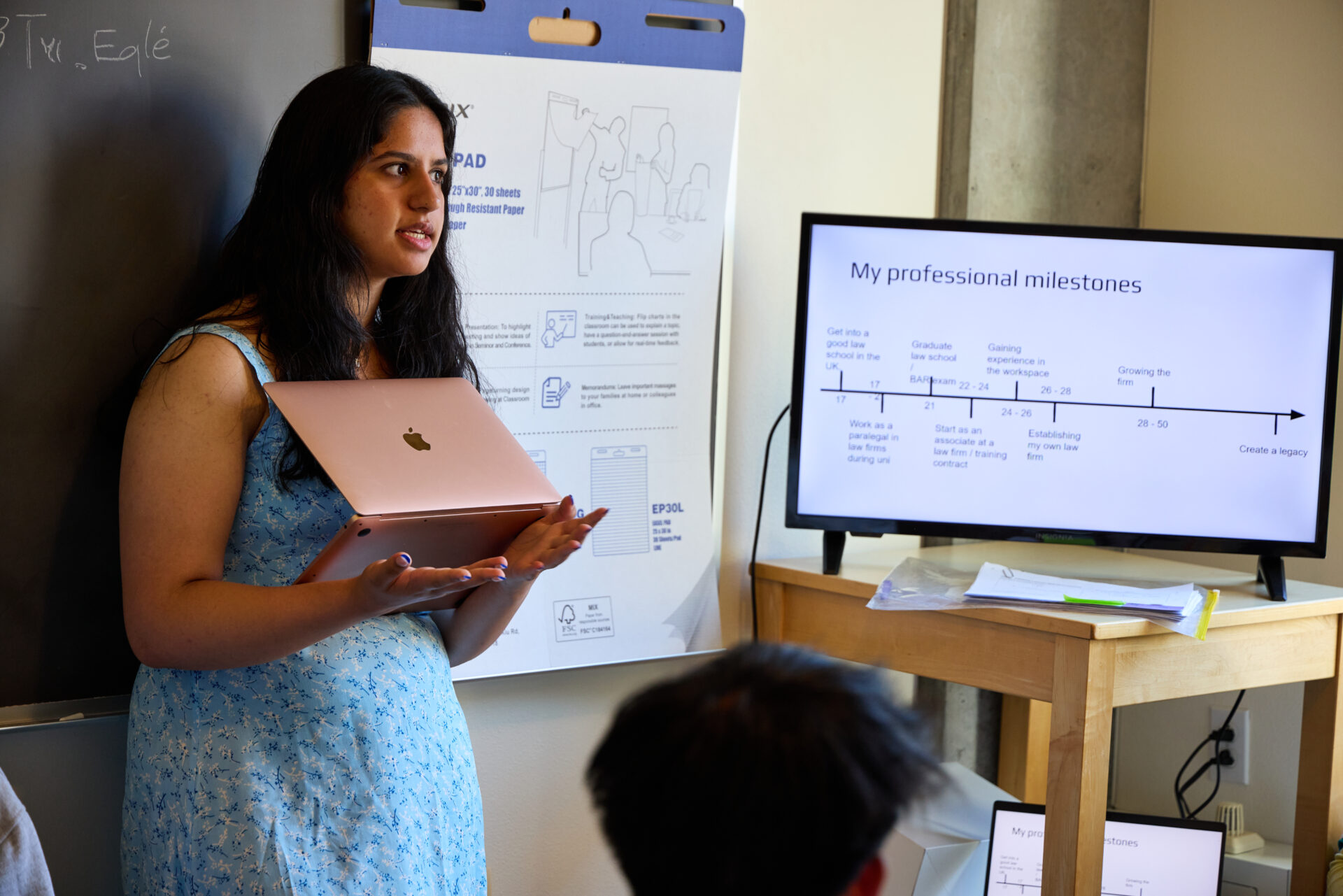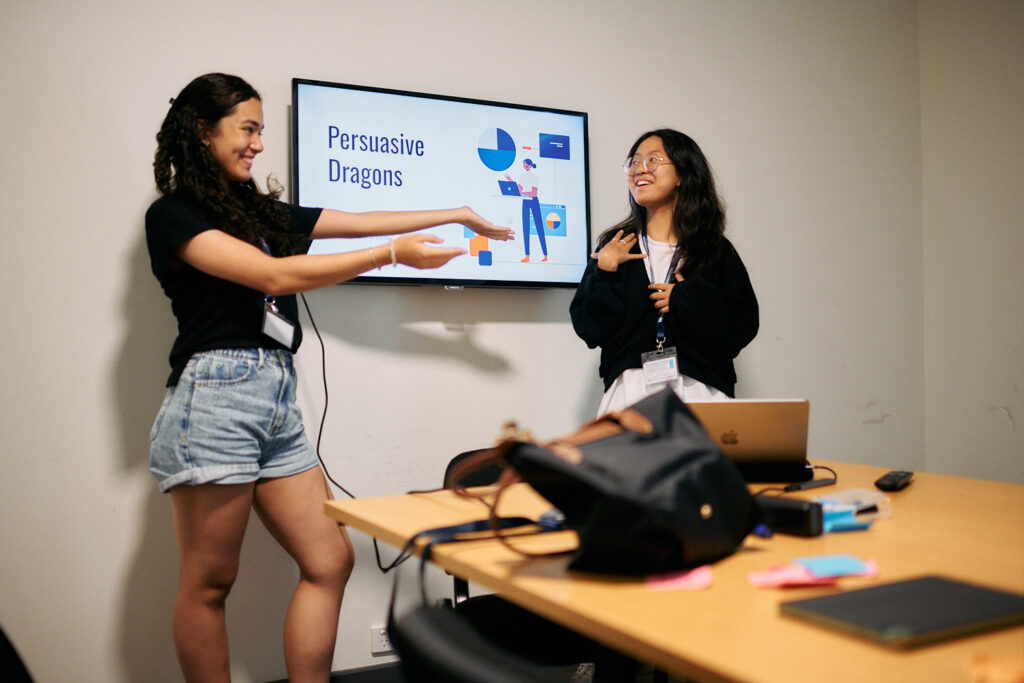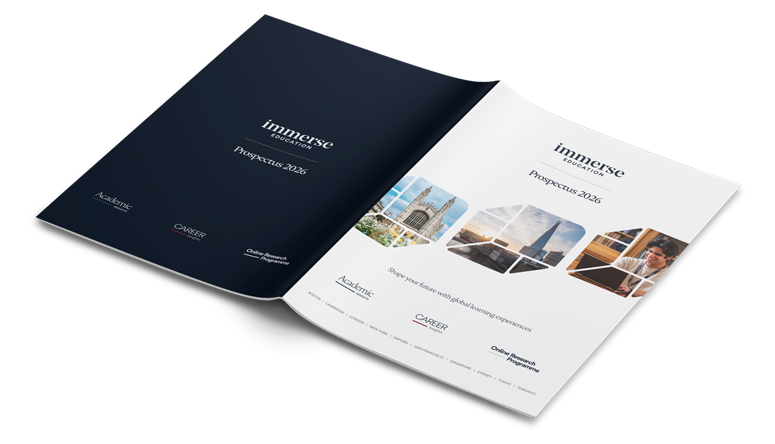Inspiring speakers inspire millions not just with their ideas but with how they present them. Learning how to improve presentation skills means mastering clarity, confidence, and emotion to connect with others.
At Immerse Education’s TED Summer School, you explore creativity and public expression in one of the world’s most inspiring cities.
This guide will help you learn how to improve presentation skills and share ideas that inspire action, drawing lessons from TED speakers and showing how Immerse programmes turn communication into confidence and influence.
What Makes a Powerful Presentation
Strong presentations are built on three pillars: structure, simplicity, and storytelling. Together, they transform information into inspiration.
Nancy Duarte, in her TED talk The Secret Structure of Great Talks, discovered that every memorable presentation follows a rhythm. Great speakers move between “what is” and “what could be,” creating contrast between reality and possibility. This clear movement gives talks direction and keeps audiences engaged.
Great speakers also use clear beginnings, purposeful visuals, and relatable stories. These elements invite audiences to listen, reflect, and imagine change. David McCandless, in The Beauty of Data Visualization, shows how simplicity turns complexity into understanding. His visuals reveal patterns and meaning without overwhelming the viewer.
At Immerse Education, you apply these same principles. In our Business Management Summer School, you analyse how companies operate today, then present how they could transform through innovation or strategy. You learn to structure ideas clearly, simplify data, and tell stories that connect logic with emotion.
Every workshop and project builds on these foundations. You combine analytical thinking with creative storytelling to make complex information persuasive and engaging. This approach helps you communicate with purpose, clarity, and influence in business and beyond.
The Psychology of Presence and Confidence
Body language plays a powerful role in presentation success. Amy Cuddy’s TED talk Your Body Language May Shape Who You Are explains that confident posture shapes how you think and feel. Her research on “power poses” shows that standing tall can increase confidence and calm nerves.
Confidence is not about being flawless; it’s about authenticity and control. Focus on movement, eye contact, and expression to project calm authority. Posture and presence work together to create trust and hold attention.
When you move with intention, your body reinforces your words. Confidence, empathy, and awareness help you connect with your audience and strengthen your message. These habits are key when exploring how to improve presentation skills through presence and body language.
The Art of Voice and Delivery
Julian Treasure’s TED talk How to Speak So That People Want to Listen reminds you that voice is your most powerful instrument.
He defines great speaking through honesty, authenticity, integrity, and love. These principles form his concept of HAIL, which helps you build genuine, respectful connections with your audience.
Treasure also highlights how pitch, tone, and pace shape emotion and meaning. The right rhythm, volume, and timing can transform how your message feels. Speaking too quickly can confuse, while a steady pace allows listeners to reflect. Silence, when used well, adds power and intention.
Listening is just as important as speaking. Treasure emphasises that great communicators listen actively to understand before responding. This creates a sense of presence and respect that strengthens every interaction.
5 Ways to Improve Presentation Skills
These techniques combine the wisdom of great speakers with the experiential learning you gain at Immerse Education. Each one highlights a different way to practise how to improve presentation skills effectively.
1. Start with a Clear Message
Every inspiring talk revolves around one central idea. Nancy Duarte calls this the “big idea,” a single takeaway that defines your talk. Before writing your script or creating slides, define your message in one precise sentence.
Immerse tutors guide you in developing focus, clarity, and structure when preparing business pitches and project presentations.
2. Tell a Story that Connects
Humans remember stories better than data. When you present, anchor your points in a meaningful narrative. Amy Cuddy uses personal experiences to make scientific concepts relatable, and you can do the same.
In the Entrepreneurship and Innovation module, you learn to weave emotion, purpose, and data together to build stories that engage and inspire.
3. Simplify Your Slides
David McCandless shows that visuals are most effective when they make information both beautiful and understandable. Use clean layouts, readable fonts, and clear graphics that complement your message.
Avoid overcrowding slides with text or data. In the Business Management Summer School, you learn to create visuals that clarify key points and strengthen your overall delivery.
4. Use Confident Body Language
Amy Cuddy’s research proves that your body influences how you think and feel. Standing tall, maintaining eye contact, and using open gestures make you appear confident and capable.
In Immerse’s TED Summer School, you practise these techniques through group classes and personal presentations, learning how posture and calm movements build authority and trust with audiences.
5. Practise Pacing and Pauses
Julian Treasure highlights rhythm and timing as essential elements of great communication. Speaking too quickly can overwhelm listeners, while a steady pace allows your ideas to land clearly. Practise using pauses to emphasise key points.
During Real-World Projects at Immerse, you rehearse delivery often, learning to speak with confidence, flow, and thoughtful rhythm.
Building Presentation Confidence through Immerse Programmes
Your confidence grows through preparation and experience.
At Immerse’s TED Summer School, you learn to communicate in diverse and creative settings. Collaborative workshops and cultural excursions build adaptability and resilience, qualities that make you a confident communicator.
In our Business Management Summer School, your focus is on leadership and persuasion. You explore strategy, problem-solving, and innovation through modules like Strategic Thinking and Operational Excellence.
These sessions teach you how to structure arguments logically and present solutions with clarity and evidence. It’s not about memorising facts; it’s about communicating ideas that lead to action.
The Real-World Project serves as the ultimate test of your presentation skills. You research a topic, prepare a professional presentation, and deliver it to peers and tutors. Feedback sessions encourage reflection, helping you identify strengths and areas for improvement.
This practical, supportive environment mirrors the preparation process of highly-skilled speakers who refine their messages through rehearsal and feedback.
Join the Immerse Education 2025 Essay Competition
Follow the instructions to write and submit your best essay for a chance to be awarded a 100% scholarship.

Avoiding 5 Common Presentation Mistakes
Even experienced speakers make mistakes. Awareness and practice help you recognise them early and turn weaknesses into growth opportunities. Identifying these errors is a vital part of learning how to improve presentation skills and communicate more effectively.
Here are some common presentation errors and what you can do instead.
1. Overloading Information
Filling slides with too much text or data overwhelms your audience and distracts from your main message. It also makes it harder for listeners to identify the key points. Focus on clarity rather than quantity.
What to do instead: Present one key idea per slide. Use short bullet points, clear visuals, or simple charts to summarise complex ideas. Keep your design minimal so your spoken explanation adds depth, helping your audience focus on you rather than your slides.
2. Reading Directly from Notes
Relying heavily on notes makes you sound detached and prevents meaningful engagement with your audience. It limits eye contact and reduces your natural energy.
What to do instead: Learn your material well enough to speak naturally and confidently. Use small cue cards or simple slide prompts to guide your flow. Practise paraphrasing key ideas in your own words so your speech feels authentic, not memorised.
3. Ignoring Visuals
Slides that simply repeat what you say add no value and can make your presentation dull. Visuals should highlight, not echo, your words.
What to do instead: Choose images, infographics, and data charts that clarify or add emotional depth to your topic. As David McCandless demonstrates, effective visuals bring simplicity to complexity. Use visuals strategically to reveal patterns, meaning, or insight.
4. Rushing Through Points
Nerves often cause speakers to talk too fast, leaving the audience unable to follow key ideas. This makes even strong messages feel rushed or unclear.
What to do instead: Slow your pace and use pauses to give listeners time to absorb key points. Julian Treasure recommends varying tone, rhythm, and pitch to maintain attention. A deliberate pause before or after a main idea helps your message resonate and shows confidence.
5. Neglecting Rehearsal
Preparation alone is not enough. Without rehearsal, you risk poor timing, uneven delivery, or technical issues. Many great speakers gain confidence through repeated practice, not memorisation.
What to do instead: Rehearse your entire presentation several times. Stand, move, and speak as you will during the real event. Practise in front of peers or tutors who can give constructive feedback. Each run helps you refine pacing, transitions, and gestures until they feel natural.
Immerse programmes give you the structure and space to develop these skills. Presentations are followed by discussions and feedback sessions.
With consistent practice, you replace anxiety with assurance and turn every presentation into an opportunity to inspire.
The Immerse Experience: Where Learning Meets Real Life
Immerse’s approach is experiential. Learning doesn’t stop in the classroom. You step into real-world environments, financial hubs, creative studios, and cultural landmarks to see communication in action.
The programme’s industry visits in New York connect theory to practice, showing how effective presentation and persuasion shape modern business.
Workshops and mentorship sessions develop not only your academic knowledge but also transferable skills like teamwork, storytelling, and confidence under pressure. Each experience prepares you to think critically, speak clearly, and lead with empathy.
By blending academic rigour with hands-on projects, Immerse programmes transform you into a confident communicator ready for university, entrepreneurship, or a global career.
Inspire Like a TED Speaker
Learning how to improve presentation skills is about unlocking your ability to connect and inspire. TED speakers remind you that the most powerful communication isn’t about perfection; it’s about authenticity, structure, and courage.
At Immerse Education, you gain these skills through real experiences.
Our TED Summer School helps you practise presence and communication in the world’s most dynamic cities, while the Business Management Summer School strengthens your structure, strategy, and storytelling. Both programmes teach you to share ideas that matter and to do so with confidence.
Start your journey towards inspiring communication. Learn how to improve presentation skills, speak with impact, and lead with clarity just like a TED speaker.



















